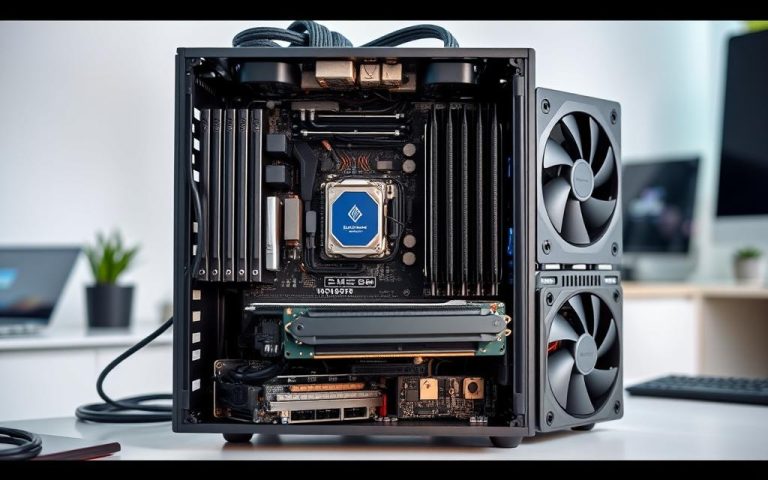What Do Computer Hardware Engineers Earn Per Hour?
The demand for skilled professionals in technology continues to rise, with hardware engineering playing a critical role in shaping modern innovations. As industries increasingly rely on advanced systems, understanding the earning potential in this field becomes essential.
Compensation for hardware engineers varies widely based on experience, location, and specialization. For instance, states like Washington and California offer some of the highest hourly rates, reflecting the competitive nature of these markets. Additionally, emerging trends such as AI hardware development are influencing earning potential.
This article explores average salary data, regional differences, and factors impacting pay. It also highlights the importance of considering total compensation, including benefits and bonuses, when evaluating this career path. For more detailed insights, check out this resource.
How Much Do Computer Hardware Engineers Make an Hour?
Compensation in the field of hardware engineering reflects diverse factors. The national average hourly wage for these professionals is approximately $45.60, based on an annual salary of $94,858. This figure represents a median value, with significant variations depending on experience and location.
Entry-level engineers typically earn around $27 per hour, translating to an annual salary of $56,078. In contrast, senior professionals with extensive experience can command hourly rates exceeding $77, resulting in annual earnings of $160,456 or more. These figures highlight the substantial growth potential in this career.
Beyond base pay, additional compensation such as bonuses and stock options can significantly augment earnings. For example, engineers working in high-demand sectors like AI systems development often receive lucrative incentives. Geographic location also plays a critical role, with urban areas generally offering higher pay compared to rural regions.
For those exploring this career path, understanding the full scope of compensation is essential. Factors like contract versus full-time employment structures further influence hourly rates. To gain deeper insights into the role and its earning potential, check out this hardware engineer career insights resource.
Key Factors Influencing Hardware Engineer Pay
Several elements shape the earning potential of hardware engineers. From experience and industry type to specialized skills, these factors collectively determine compensation levels. Understanding these influences can help professionals maximize their earning potential.

Experience and Seniority
Experience plays a pivotal role in determining engineer salaries. Junior engineers typically start with lower earnings, while senior roles command significantly higher pay. For instance, moving from an entry-level position to a principal role can result in a 50-75% salary increase.
Senior professionals often handle complex systems and lead teams, justifying their higher compensation. This progression highlights the importance of career growth in this field.
Industry and Employer Type
The industry you work in also impacts your earnings. For example, hardware engineers in semiconductor manufacturing often earn more than those in consumer electronics. Additionally, roles in defense contracting, especially those requiring security clearances, offer premium pay.
Employer type matters too. Large corporations and tech giants tend to offer higher salaries compared to smaller firms. This variation underscores the need to choose the right industry and employer.
Specialized Skills
Mastering specialized skills can significantly boost your earning potential. Proficiency in EDA tools and scripting languages like MATLAB, Python, or Perl is highly valued. For instance, expertise in FPGA programming can add a 15-20% wage premium.
Cloud infrastructure knowledge is another sought-after skill, driving pay bumps of 25% or more in server hardware roles. These skills demonstrate the importance of continuous learning in this evolving field.
“The ability to adapt and acquire new skills is crucial for staying competitive in hardware engineering.”
| Factor | Impact on Salary |
|---|---|
| Experience | 50-75% increase from junior to principal roles |
| Industry | Semiconductor manufacturing pays higher than consumer electronics |
| Specialized Skills | FPGA programming adds 15-20%, cloud expertise adds 25%+ |
By focusing on these factors, hardware engineers can strategically enhance their earning potential. Whether through gaining experience, choosing the right industry, or mastering specialized skills, the opportunities for growth are substantial.
Computer Hardware Engineer Salary by State
Geographic location plays a significant role in determining earnings for professionals in hardware engineering. Salaries can vary dramatically depending on the state, with some regions offering significantly higher pay than others. Understanding these differences is crucial for those considering relocation or remote work opportunities.
Top-Paying States
California, Nevada, and Washington are among the top-paying states for hardware engineers. In California, the average annual salary reaches $164,980, driven by the tech hub of Silicon Valley. Nevada follows closely with $161,630, benefiting from its no-income-tax policy. Washington, home to major tech companies, offers an average of $152,460.
These states not only provide competitive pay but also host thriving tech ecosystems. However, it’s important to consider the higher cost of living in these areas, which can offset some of the financial benefits.
States with Lower Earnings
On the other end of the spectrum, states like Kentucky and Mississippi offer lower average salaries. Kentucky’s average is $62,990, while Mississippi stands at $74,150. These figures reflect the lower demand for hardware engineering roles in these regions.
While the cost of living is generally lower in these states, the reduced earning potential may not align with the financial goals of some professionals.
Regional Cost of Living Adjustments
The cost of living plays a critical role in evaluating salaries. For example, Seattle’s 30% higher cost of living compared to the Midwest means that a $150,000 salary in Washington may not go as far as a $120,000 salary in a less expensive region.
Remote work has also begun to influence geographic salary differentials. Professionals working remotely for companies in high-paying states may still enjoy competitive salaries while living in lower-cost areas.
Additionally, Puerto Rico offers an average salary of $78,000, with tax advantages that can make it an attractive option for some engineers.
Hourly vs. Annual Salary Breakdown
Breaking down salary structures helps employees evaluate their compensation effectively. For professionals in engineering, understanding the difference between hourly and annual earnings is crucial. The standard method to convert annual figures to hourly is by dividing the yearly salary by 2,087, the average number of work hours in a year.

Exempt and non-exempt statuses significantly impact pay structures. Exempt employees, typically salaried, are not eligible for overtime, while non-exempt employees earn hourly wages and qualify for overtime pay. This distinction is vital for employees to understand their rights and benefits.
Overtime eligibility varies across employment categories. For example, contractors often negotiate higher hourly rates, ranging from $75 to $125, compared to W-2 employees. However, contractors may miss out on benefits like health insurance and retirement plans.
- Exempt Employees: Salaried, no overtime pay.
- Non-Exempt Employees: Hourly, eligible for overtime.
- Contractors: Higher hourly rates, fewer benefits.
Stock-based compensation is another critical factor, especially in public tech companies. Employees often receive stock options or equity, which can significantly enhance their total earnings. This form of compensation aligns employee interests with the company’s success.
| Employment Type | Hourly Rate | Benefits |
|---|---|---|
| W-2 Employee | $45-$77 | Health, retirement |
| Contractor | $75-$125 | Limited |
Evaluating both hourly and annual pay structures provides a comprehensive view of compensation. Whether you’re an employee or contractor, understanding these nuances ensures you make informed career decisions.
How Hardware Engineer Salaries Compare to Similar Careers
Understanding how salaries stack up across engineering fields provides valuable insights. Professionals in hardware engineering often wonder how their earnings measure up against roles like software developers, data engineers, and other engineering specialties. This comparison sheds light on career opportunities and industry trends.
Vs. Software Developers and Data Engineers
Hardware engineers earn slightly less than data engineers, with an average salary of $95,000 compared to $100,000. This difference reflects the growing demand for data expertise in industries like AI and machine learning. However, hardware roles remain critical in sectors like telecommunications and aerospace.
When compared to software developers, hardware engineers often face a narrower pay gap. Both roles require specialized skills, but software developers benefit from the rapid expansion of digital solutions across industries. The convergence of IoT is blurring these pay scales, as professionals with expertise in both hardware and software are increasingly valued.
Vs. Other Engineering Roles
Hardware engineers earn 3% more than automotive engineers, with both averaging $95,000 annually. This parity highlights the importance of physical systems in both fields. However, hardware engineers earn 13% less than mining engineers, who command an average of $98,000 due to the specialized nature of their work.
Career growth trajectories also differ. Hardware engineers often focus on design and development of physical components, while mining engineers prioritize resource extraction. These distinctions influence earning potential and career paths.
“The ability to adapt and acquire new skills is crucial for staying competitive in engineering careers.”
| Role | Average Salary |
|---|---|
| Hardware Engineer | $95,000 |
| Data Engineer | $100,000 |
| Automotive Engineer | $95,000 |
| Mining Engineer | $98,000 |
Compensation packages also vary. FAANG companies often offer RSUs and bonuses for hardware roles, while startups may provide equity incentives. Patent-based bonuses are another factor, rewarding innovation in fields like embedded systems and IoT.
Ultimately, choosing a career in hardware engineering or a related field depends on individual interests and long-term goals. Understanding these salary comparisons helps professionals make informed decisions.
Educational and Experience Requirements
Becoming a hardware engineer requires a strong foundation in education and hands-on experience. Most roles demand an ABET-accredited bachelor’s degree in engineering, ensuring candidates meet rigorous standards. This accreditation is particularly important for government roles, where it is often a prerequisite.

Many professionals start their careers as technicians, gaining practical skills before transitioning to engineering roles. This path typically involves earning an associate degree or certification, followed by a bachelor’s degree in engineering. Hands-on experience in product development or systems design is crucial for advancement.
Pursuing a master’s degree can significantly enhance earning potential, offering a 15-20% salary boost. This advanced education equips engineers with specialized knowledge, making them more competitive in the job market. Additionally, obtaining a Professional Engineer (PE) license can open doors to higher-level responsibilities and leadership roles.
Certifications from leading companies like Cisco and Microsoft also add value. These credentials can increase salaries by 10-15%, reflecting the high demand for specialized skills. For example, Cisco-certified professionals often earn around $120,000 annually, while Microsoft-certified roles average $115,000.
Understanding these requirements helps aspiring engineers plan their career paths effectively. Whether through advanced education, certifications, or licensure, investing in professional development is key to long-term success in this field.
Industries with the Highest Pay for Hardware Engineers
Certain industries stand out for their high-paying hardware engineering roles. From defense to automotive and AI, these sectors offer competitive salaries and unique benefits. Understanding these opportunities can help professionals make informed career decisions.
The defense sector is a top payer, especially for roles requiring security clearances. Engineers in this field often earn $120,000 to $150,000 annually. The specialized nature of defense projects and the need for expertise in secure systems drive these salaries.
In the automotive industry, compensation varies between OEMs and suppliers. Engineers working directly for manufacturers like Tesla or Ford typically earn more, with salaries averaging $110,000. Suppliers, on the other hand, offer slightly lower pay, around $95,000, but often provide additional benefits.

Startups and established companies offer different compensation structures. Startups often provide equity packages, which can be lucrative if the company succeeds. Established firms, however, focus on 401k matches and comprehensive benefits, making them attractive for long-term stability.
AI chip companies are another high-paying sector, with salaries exceeding $200,000 for senior roles. Companies like NVIDIA and Intel lead the way, offering competitive packages to attract top talent. This reflects the growing demand for AI hardware development.
“Choosing the right industry can significantly impact your earning potential as a hardware engineer.”
Consulting and product development roles also differ in pay. Consultants often earn higher hourly rates, ranging from $100 to $150, while product development engineers benefit from stable salaries and bonuses. Both paths offer unique advantages depending on career goals.
| Industry | Average Salary |
|---|---|
| Defense | $120,000 – $150,000 |
| Automotive OEM | $110,000 |
| AI Chip Companies | $200,000+ |
| Consulting | $100 – $150/hour |
By targeting these high-paying industries, hardware engineers can maximize their earning potential. Whether through specialized roles, equity packages, or consulting opportunities, the possibilities are vast.
Future Outlook for Hardware Engineer Salaries
The future of hardware engineering is shaped by emerging technologies and industry trends. With a projected 5% job growth from 2022 to 2032, this field remains a promising career path. The Bureau of Labor Statistics highlights the increasing demand for skilled professionals in this sector.
Quantum computing is set to revolutionize the industry, creating niche skill premiums. Engineers with expertise in this area can expect higher salaries due to the specialized knowledge required. This trend reflects the broader shift toward advanced technology in engineering roles.
Reshoring effects are also influencing domestic salary scales. As companies bring manufacturing back to the U.S., demand for local hardware engineers is rising. This shift is expected to boost earnings, particularly in regions with growing tech hubs.
Green tech incentives are another factor shaping compensation. Engineers working on sustainable solutions are likely to see increased pay as industries prioritize eco-friendly innovations. This aligns with global efforts to combat climate change.
Finally, the demand for VR hardware is driving pay for AR/VR specialists. As virtual reality becomes more integrated into everyday life, engineers with skills in this area are in high demand. This trend highlights the importance of continuous learning in staying competitive.
| Trend | Impact on Salaries |
|---|---|
| Quantum Computing | Niche skill premiums |
| Reshoring | Increased domestic demand |
| Green Tech | Higher pay for sustainable solutions |
| VR Hardware | Pay boosts for AR/VR specialists |
These trends underscore the dynamic nature of hardware engineering. By staying ahead of industry shifts, professionals can maximize their earning potential and secure a strong position in the future job market.
Conclusion
Navigating the landscape of hardware engineering salaries reveals both opportunities and challenges. The national average for this field stands at $45.60 per hour, with significant variations across states like California and Washington. These regional differences highlight the importance of location in shaping compensation.
Skill development remains a key driver of salary growth. Professionals who invest in specialized expertise, such as FPGA programming or cloud infrastructure, often see substantial pay increases. Emerging industries like AI and quantum computing also offer lucrative opportunities compared to traditional sectors.
For career advancement, focusing on continuous learning and certifications can yield high returns. Additionally, understanding the balance between hourly and annual salary structures ensures informed decision-making. As the field evolves, trends like reshoring and green tech are expected to further influence engineering compensation.
By staying adaptable and proactive, engineers can maximize their earning potential and thrive in this dynamic career path.
FAQ
What is the national average hourly wage for computer hardware engineers?
The national average hourly wage for computer hardware engineers is approximately . This figure can vary based on location, experience, and industry.
What is the salary range for entry-level to senior computer hardware engineers?
Entry-level hardware engineers typically earn around per hour, while senior engineers can make upwards of per hour. Experience and specialization significantly impact earnings.
What factors influence the pay of computer hardware engineers?
Key factors include experience, seniority, industry, employer type, and specialized skills such as proficiency in EDA tools or scripting languages.
Which states offer the highest pay for computer hardware engineers?
California, Nevada, and Washington are among the top-paying states for hardware engineers, offering higher hourly wages compared to the national average.
How does the cost of living affect hardware engineer salaries by state?
States with a higher cost of living, like California, often offer higher wages to offset expenses. Conversely, states with lower living costs, such as Kentucky, may have lower salaries.
How does the hourly wage compare to the annual salary for hardware engineers?
On average, hourly wages translate to an annual salary of around 5,000. This varies based on hours worked and additional compensation like bonuses.
How do hardware engineer salaries compare to software developers and data engineers?
Hardware engineers often earn slightly more than software developers but may earn less than data engineers, depending on the industry and specialization.
What are the educational requirements for becoming a computer hardware engineer?
A bachelor’s degree in computer engineering, electrical engineering, or a related field is typically required. Advanced roles may require a master’s degree or certifications.
Which industries offer the highest pay for hardware engineers?
Industries like technology, aerospace, and telecommunications often provide the highest compensation for hardware engineers due to the complexity and demand for their skills.
What is the future outlook for hardware engineer salaries?
The demand for hardware engineers is expected to grow, particularly in emerging fields like AI and IoT, which could lead to increased salaries and opportunities.















